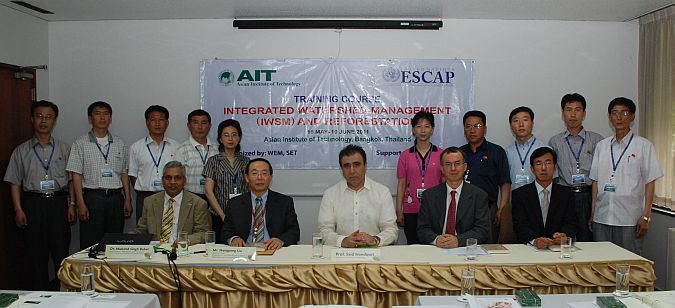
Management (IWSM) and Reforestation is part of the project "Promoting
Regional and Economic Cooperation in North-East Asia with particular
focus on the Democratic People's Republic of Korea (DPRK)” implemented
by United Nations Economic and Social Commission for Asia and the
Pacific (UNESCAP).Delivering the opening remarks for the course on 16 May 2011, Prof.
Said Irandoust, President, AIT, welcomed the participants to the AIT
campus and said that they were all now a part of the “AIT family”. He
said the objectives of the training course to benefit sustainable
development and the environment in the DPRK were very much aligned with
AIT’s purposive approach to learning, research, outreach and capacity
building.
“Unlike other universities, capacity-building here is a key,” said
President Irandoust, stressing the appropriateness that the training
for DPRK officials takes place at AIT.
The course, conducted largely by AIT faculty and implemented by
UNESCAP, has been tailor-made for government officers and technical
personnel from North Korea. The training aims to develop capacity of
officials and experts in implementing projects related to watershed
management, project appraisal, and to conduct studies and project
development for sustainable and holistic development.
The curriculum has been jointly prepared by UNESCAP and AIT and is
based on the requirements for staff training prepared by the Ministry
of Land and Environment Protection and the State Academy of Sciences,
Government of the DPRK.
President Irandoust expressed his delight and thanks that such a unique
program has been developed with UNESCAP, whom he called a “great
partner” of AIT. The partnership has been spearheaded Dr. Mukand Singh
Babel, Coordinator, Water Engineering and Management (WEM) Field of
Study, School of Engineering and Technology (SET).
Representing UNESCAP, Mr. Hongpeng Liu, Officer-In-Charge, Energy
Security and Water Resources Section of the Environment and Development
Division, said water and land are two vital resources that impact each
other and require an integrated approach to manage. Watershed
management and hydropower are important for mitigating the impacts of
climate change, and are a part of green growth and sustainable
development, he said.
Dr. Babel said the training stresses linking theory and practical
application. It is designed to equip DPRK administrators, project
planners and engineers to build up their knowledge and skills in
project identification, definition, planning and implementation.
Participants will learn through a combination of lecture, discussions,
exercises, case studies, demonstrations, workshops and field visits.
The North Korean officials will also pay study visits to Thailand’s
Huay Sai Royal Development Study Center and the Monkey Cheek Physical
Model for Sanam Chai-Mahachai Canal Project, a project of His Majesty
King Bhumibol Adulyadej. Both are located in Petchaburi
province.

